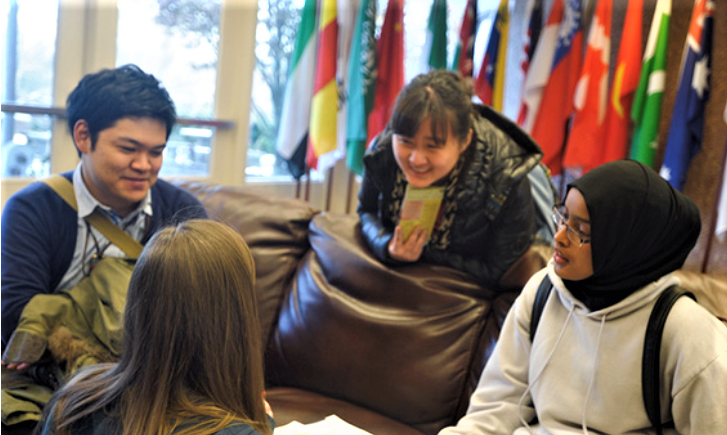A year ago, Gonzaga University in Spokane, Wash., was at a crossroads in serving international students. Spreadsheets and other manual tasks used to track data had become too cumbersome and time-consuming to maintain and keep updated.
So, its Center for Global Engagement turned to a software solution called Terra Dotta to help in the process of automating many critical functions for International Student and Scholar Services (ISSS). The result was a more streamlined process that allowed staff to focus less on the mundane details and more on providing an array of personal touches.
The timing couldn’t have been more crucial. As the launch was happening, the COVID-19 pandemic was starting to explode. International students were suddenly thrust into an uncertain global crisis, needing more support than ever to navigate through documentation and requirements for compliance.
“We were able to support our students mentally and emotionally rather than continuing to deep dive into spreadsheets,” says Brittany Harmon, International Student Advisor at Gonzaga. “We’ve been able to communicate with them more efficiently, keep them apprised of constant changes in COVID, quarantine regulations, travel restrictions and make sure they have what they need. Terra Dotta turned out to be the best thing that could have happened.”
For the 100-plus students in the program – Gonzaga is expecting 130 to 150 as restrictions ease in the fall – they’ve had very little red tape and issues to deal with on the university side. As Gonzaga switched learning modalities this year, international students were able to maintain their status even if they studied virtually from their home countries.
“Gonzaga is an in-person school and has always been, but in order to serve our students, even domestic students, we switched to an online hybrid format,” Harmon says. “Abroad, that can be a 13-hour time difference. With Terra Dotta, we were able to support them more academically. It allowed them to go through training modules for OPT (Optional Practical Training) to make requests. They didn’t have to wait for information or have questions answered. There were a lot fewer delays.”
Solving the problem head on
Gonzaga’s ISSS program, which has a collaborative relationship with Shorelight, pulls in students from countries all over the world – China, India, Vietnam, Albania, Russia, Moldova, Mexico, Venezuela and Honduras and quite a few from France, the Czech Republic and Saudi Arabia. Keeping them informed of tasks they must complete was a nightmare in the old system.
“It was a lot of work, a lot of manual labor, a lot of Excel spreadsheets,” Harmon says. “Those are prone to human error and require regular auditing. We would occasionally have date mistakes. We would occasionally have a student that didn’t get registered in time. Even though their passport expiration date is a student’s responsibility, we like to send reminders because students forget things like that. We weren’t able to do that as well as we hoped. Lately, there have been a lot of delays [in processing].”
Because of the lack of functionality, there was less time for academic advising, cultural advising and personal connections – from support and guidance to providing personal items such as bedding and storage so “they have a family support system when they arrive,” Harmon says.
“We’re more than just immigration advisors,” she says. “We’re people who know them, who care for them. We know them all personally. We’re there for their orientation. We meet with them and have activities where we attend. We’re there to give them the perks that our domestic students have. But the more students we got, the less we were able to have those fun, personal touches.”
That’s when it became apparent that they needed a solution. Instead of having to send and track reminders on Student and Exchange Visitor Program (SEVIS) immigration and visa deadlines, Terra Dotta (a cloud-based platform connected to the SIS) did it for them. Instead of having to chart students who were at risk of F-1 visa non-compliance with fewer than 12 credits, Terra Dotta reminded them.
“Now, things have completely changed,” Harmon says. “We have that backup of the system that sends us reports and does audits for us. It’s always nice to be able to sort it out the day the student drops below 12 credits because they absentmindedly just thought they could get rid of their math class. It’s made a big difference in the way that we are able to serve our students.
“There’s lot less anxiety in our in our work. If we’re diving into spreadsheets, that means we get to spend less time having a one-on-one meeting, talking with them about how to work through culture shock or how to communicate better with their teacher who may have a different idea of what an academic essay looks like.”
Remaining competitive
Harmon says that for ISSS departments at other institutions who are facing similar barriers, a software solution might be the answer.
“If your priority is seamless and efficient communication with your students that you’re able to track – which for liability reasons can be important for an institution – and you’d rather spend time helping students adjust to American academic culture, Terra Dotta should be something you invest in,” she says. “It allows you to work smarter, not harder. We have time for projects. We have time for programming.”
Institutions that lag behind in their processes, face delays in responding to students, or simply make costly bookkeeping mistakes by using outdated processes run the risk of losing students.
“Competing for the international student populations at your school is harder now than it has ever been,” Harmon says. “Choosing this kind of a system allows you to provide those services that make you a competitive institution, that draw those excellent international students. Not every institution can afford it, but I think it’s worth the investment.”
Gonzaga, known for its amazing retention rates, its politically active students, its fervent alumni and of course, the basketball team that reached the NCAA Men’s Final (and by the way, has players from Lithuania, Russia, France and Mali), wants to be a continuing destination for international students. It recently hired a new ISSS director and is seeking to boost internationalization and globalization on campus.
“We want to increase our touch across campus,” Harmon says. “There’s been a call for an increase in international student population and more international student participation in different programming across campus. That’s very exciting, but it does take time. That’s why it’s so important to increase access to intercultural and interpersonal trainings for faculty and staff so if we have that increase in numbers, those students can be supported in the way they need to be academically successful.”









